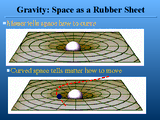Search Results
6/15/2025, 6:42:56 PM
>>712731430
Atomic clocks aren't mechanical clocks, they measure the extremely reliable frequency of atoms with extreme precision, enabling accurate timekeeping at the nanosecond scale and beyond. Their accuracy is not based on mechanical calibration, it's based on the known and unchanging physical properties of these atoms. This is such an accurate way to measure time that our definition of a second is based on it.
These clocks are used for extremely precise time measurements on things like GPS satellites which need to maintain the most accurate positional data possible at all times. Being in orbit, these satellites experience Earth's gravity less intensely than objects on Earth's surface do, which due to gravity's effect on space-time as described by relativity means that objects on the ground experience events more quickly than objects in orbit.
These relativistic effects create a discrepancy not in the extremely accurate measurements but in the extremely reliable physical process being measured, amounting to an error on the order of a few microseconds per day. This is completely insignificant from a human perspective, but for the extremely precise mechanics of orbital communication which requires accuracy within nanoseconds, the effects of time dilation would cause the complete failure of all satellite and orbital networks within hours or days if not constantly corrected and accounted for.
The "atomic clocks in orbit" example is most common because it has some direct relevance to our daily lives that rely on satellites, but relativity and time dilation has been repeatedly confirmed by experiments and observations on Earth too.
https://en.wikipedia.org/wiki/Hafele–Keating_experiment
Atomic clocks aren't mechanical clocks, they measure the extremely reliable frequency of atoms with extreme precision, enabling accurate timekeeping at the nanosecond scale and beyond. Their accuracy is not based on mechanical calibration, it's based on the known and unchanging physical properties of these atoms. This is such an accurate way to measure time that our definition of a second is based on it.
These clocks are used for extremely precise time measurements on things like GPS satellites which need to maintain the most accurate positional data possible at all times. Being in orbit, these satellites experience Earth's gravity less intensely than objects on Earth's surface do, which due to gravity's effect on space-time as described by relativity means that objects on the ground experience events more quickly than objects in orbit.
These relativistic effects create a discrepancy not in the extremely accurate measurements but in the extremely reliable physical process being measured, amounting to an error on the order of a few microseconds per day. This is completely insignificant from a human perspective, but for the extremely precise mechanics of orbital communication which requires accuracy within nanoseconds, the effects of time dilation would cause the complete failure of all satellite and orbital networks within hours or days if not constantly corrected and accounted for.
The "atomic clocks in orbit" example is most common because it has some direct relevance to our daily lives that rely on satellites, but relativity and time dilation has been repeatedly confirmed by experiments and observations on Earth too.
https://en.wikipedia.org/wiki/Hafele–Keating_experiment
Page 1
